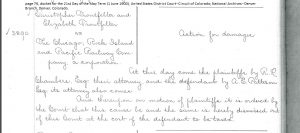The case packet makes no specific mention of the disposition of the case of Christopher and Elizabeth Troutfetter versus the Chicago, Rock Island and Pacific Railway.
The record book does. It indicates that the plaintiffs motioned for the case to be dismissed during the May 1900 term of the U.S. Circuit Court, Denver Circuit. One has to read the heading of the page very carefully and not interpret it incorrectly. The Troutfetters motion was made on the 21st day of the May term of the court which was held on 1 June 1900. Like most courts, the U. S. Circuit Court, Denver Circuit, had specific “terms” when cases, motions, etc. were heard and decisions and rulings issued. One should not hastily jump to the conclusion that the dismissal was on 21 May because it wasn’t. The May term had simply extended into June.

No reason is given for the Troutfetter’s request for dismissal and the court ordered the Troutfetters to pay the defendant’s costs. It is always advised when using court records that one not rely solely on the casefile of court papers. While the casefile generally contains significant information, order books, dockets, ledgers, etc. can provide additional details. That was certainly the case in this situation. Even though the details were sparse, they allowed me to determine that the case was dismissed and that’s why there were no further records in the casefile.
Why was the case dismissed? That’s more difficult to say because the dismissal was at the request of the Troutfetters and not the result of a legal decision issued by the judge. The Troutfetters don’t have to give a reason why they wish the case to be dismissed.
It may be that the Troutfetters (or their lawyers) decided they really did not have a cause against the railroad. It a future post we will see what the details of the case were and why they may have decided it was time to call it quits.

No responses yet